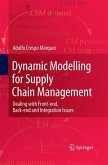Enriching understanding of the current theoretical debate on project-based learning and R&D sourcing, 'Project-based Knowledge in Organizing Open Innovation' draws on innovation literature and knowledge-based perspectives to solve open problems in the relationship between knowledge development at project level and how firms organize product innovation combining in-house R&D activities with inbound open innovation.
Through field research in different industrial settings (pharmaceutical, automotive and machine tools) and with complementary methodological approaches, this book provides empirical evidence on how project knowledge features affect sourcing decisions at firm level.
Due to the emerging interest in the management literature on project-based organizations and on the relevance of project forms of organizing in a knowledge-based economy, this volume will appeal to scholars and students in business and management, in particular those in innovation management, organization theory and strategic management.
Addressing the still open issue of how the firm level should be complemented by studies at the project level of analysis, this book provides theoretical and empirical arguments on the advantages of a more fine-grained level of analysis to understand how firms organize their innovation processes across boundaries.
Through field research in different industrial settings (pharmaceutical, automotive and machine tools) and with complementary methodological approaches, this book provides empirical evidence on how project knowledge features affect sourcing decisions at firm level.
Due to the emerging interest in the management literature on project-based organizations and on the relevance of project forms of organizing in a knowledge-based economy, this volume will appeal to scholars and students in business and management, in particular those in innovation management, organization theory and strategic management.
Addressing the still open issue of how the firm level should be complemented by studies at the project level of analysis, this book provides theoretical and empirical arguments on the advantages of a more fine-grained level of analysis to understand how firms organize their innovation processes across boundaries.








